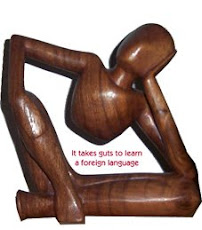Monday, April 26, 2010
"We still believe in grammar" - Nietzsche
All things are subject to interpretation; whichever interpretation prevails at a given time is a function of power and not truth. Friedrich Nietzsche
And we should consider every day lost on which we have not danced at least once. And we should call every truth false which was not accompanied by at least one laugh. Friedrich Nietzsche
"I am afraid we cannot be rid of God because we still believe in grammar." Friedrich Nietzsche.
[Entering Neitzsche + God + grammar in google will bring up the variations of this quote and some excellent articles and discussion. Nietzsche had a real wit and sense of humour, I've discovered.]
I still believe in grammar. Those who fantasize that instructed second language acquisition can occur without understanding of the patterns [systematicity and variability] of a language do students a disservice. Krashen would have us believe it can all be implicit. Not in Australian classrooms, except perhaps some immersion programs. Grammar is a gift from our ancestors (a 'glamour') - their cognitive solutions for encoding reality - and in teaching, it should be made enthralling in its intricacy. Grammar explication and exercises should be only a part of a language program. There are drama approaches, story and song - all of them exist because based on grammar (and semantics, pragmatics and discourse rules etc) and all manner of literature and culture studies are possible. But I suppose everything depends on what goals and activities your context allows, what your teacher knowledge, experience and confidence equip you with and the disposition of students and the community who put values and borders in their minds. What do you think?
And we should consider every day lost on which we have not danced at least once. And we should call every truth false which was not accompanied by at least one laugh. Friedrich Nietzsche
"I am afraid we cannot be rid of God because we still believe in grammar." Friedrich Nietzsche.
[Entering Neitzsche + God + grammar in google will bring up the variations of this quote and some excellent articles and discussion. Nietzsche had a real wit and sense of humour, I've discovered.]
I still believe in grammar. Those who fantasize that instructed second language acquisition can occur without understanding of the patterns [systematicity and variability] of a language do students a disservice. Krashen would have us believe it can all be implicit. Not in Australian classrooms, except perhaps some immersion programs. Grammar is a gift from our ancestors (a 'glamour') - their cognitive solutions for encoding reality - and in teaching, it should be made enthralling in its intricacy. Grammar explication and exercises should be only a part of a language program. There are drama approaches, story and song - all of them exist because based on grammar (and semantics, pragmatics and discourse rules etc) and all manner of literature and culture studies are possible. But I suppose everything depends on what goals and activities your context allows, what your teacher knowledge, experience and confidence equip you with and the disposition of students and the community who put values and borders in their minds. What do you think?
Wednesday, April 7, 2010
The joyful release of meaning
"Until then, my forays into written French had been purely utilitarian, the completion of almost mathematical exercises. When I comprehended a new phrase, it was merely a bridge to the next exercise. Never before had I known the sudden quiver of understanding that travels from word to brain to heart, the way a new language can move, coil, spring into life under the eyes, the almost savage leap of comprehension, the instantaneous, joyful release of meaning, the way the words shared their printed bodies in a flash of heat and light. Since then I have known this moment of truth with other companions: German, Russian, Latin, Greek, and - for a brief hour - Sanskrit." From The Historian, (p. 188), a novel by Elisabeth Kostova (about Vlad the Impaler alias Dracula, about the Byzantine and Ottoman Empires, about books, readers, libraries and historians) Interview with her at About.com.
Subscribe to:
Posts (Atom)







 http://www.mckinsey.com/locations/ukireland/publications/pdf/Education_report.pdf
http://www.mckinsey.com/locations/ukireland/publications/pdf/Education_report.pdf
